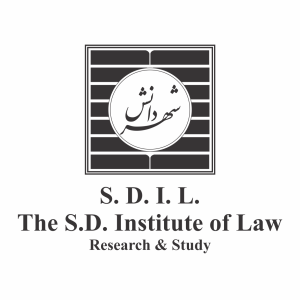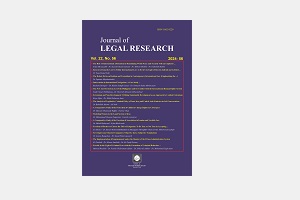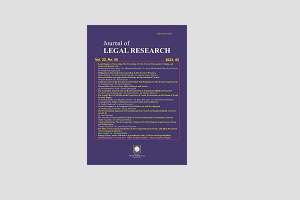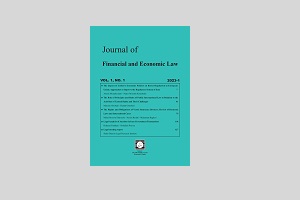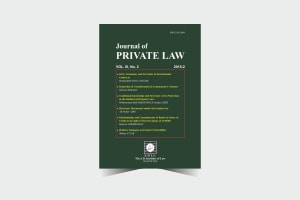Journal of
Legal Research
Number 17
Vol. IX No. 1
Spring –Summer 2010
ISSN: 1682-9220
Managing Editor: Vahid Eshtiagh
Editor-in-Chief: Seyyed Ghasem Zamani
CONTENTS
Articles
Claim Description in the Law and Judicial Practice
Abdollah Khodabakhshi (ph.D.)
Fundamental principles of UNCITRAL Electronic Communicatio
ns Convention (With Reference to Iran’s Electronic Commerce Act)
Ali Rezaee
Social Security Components in Criminal Laws
Javad Salehi
Recognition in International Law: Legal Effects of Recognition of
Kosovo, South Ossetia and Abkhazia
Seyed Yaser Ziaee
Principles of Conflict of Evidences
Rahman Amrevani
The Effects of the International Criminal Law in the Middle – East; from the Saddam’s Trial to the Hariri’s Accused Prosecution
Yalda Mozafarian
Special Issue: The Stock Exchange
(Some Considerations on the Law of Iran and other Countrise)
Fundamentals of Obligation for Providing Information to Stock Exchange
Mohammad Nowruzi
Comparative Study of Prohibitions of Insider in Securities Dealing in E.U., English, French and Iranian Laws
Seyed Elhamodin Sharifi (Ph.)
Shaghayegh Beheshti
Some Considerations on the Offense of Insider Trading
Gholamali Mirzaei Monfared
Combating the Securities Fraud in the Stock Exchange (The Case of the U.S.)
Vahid Eshtiagh (Ph. D.)
Some Considerations on Judgments about the Insider Trading in the Stock Exchange
Alireza Mohammadi
The Stock Broker Liability and the Process of Bringing the Case before the Proper Forum
Hossein Ghorbaniyan
The Liability of Brokers for the Unauthorized Transaction of Securities in the Approach of Arbitration Bord
Mohaddeseh Fereidoon
Kourosh Kaviani (Ph. D.)
Sukuk’s Rule in Financing the Projects and its Rules and Regulations
Maryam Ebrahimi
Arbitration of Disputes in Commercial Paper Market
Saleh Yarmrali
The Nature and the Jurisdictions of the Board of Arbitration of the Stock Exchange
Ebrahim Abdipour (Ph. D.)
Mohammad Bagher Parsapour (Ph. D.)
Alireza rajabzadeh (Ph. D.)
The Rules Governing the Formation of Public Joint-Stock Companies in light of the Securities Market Act of The Islamic Republic of Iran (2005)
Mohammad Soltani (Ph. D.)
Legal Consequences of Iran’s Accession to WTO on Securities Service
Mohsen Sadeghi (Ph. D.)
Cross-Border Stock Exchange Mergers: an Illusion or a Reality?
Aramesh Shahbazi (Ph. D.)
Critique and Presentation
Some Consideration on the “ICJ’S Kozovo Advisory Opinion”
Abdollah Abedini
Considerations on the Concept of the ‘Aggression’ in the Review Conference of the Statue of International Criminal Court
Zeinab Pourkhaghan
Some Critics on the Modern Law of Compulsory Insurance of the Owners of Vehicles 2008
Nasrin Tabatabai hesari
The Non-Traditional Trademarks
Sooreh Sadeghi
Resolution 1929 of the Security Council: The Challenges of the Power and the Right in a Divided world
Nader Saed (Ph. D.)
The 6 th Round of the moot Court Simulation of the International Criminal Court’s Session (2010 Summer and Autumn)
Saeed Farhadnia
Esmaeel Taver
Aliakbar Siapoosh
Articles
Claim Description in the Law and Judicial Practice
Abdollah Khodabakhshi (ph.D.)
Abstract:
Legal description is to place the different subjects and issues under the
proper Legal title. To describe the claim in proper manner, the intention of the claimant should be cleared, the terms and the conditions should be crystallized and any mistakes may cause to rejection of the claim. There are some obscurities in the legal description of the claim in the law and practice in Iran’s legal system.In thisarticle we will analysis the challenges and problems of the legal description of the claim in Iran’s Law and practice.
Keywords: claim, Claimant, Jurisprudence, Legal Proceedings
Fundamental principles of UNCITRAL Electronic
Communications Convention (With Reference to Iran’s Electronic Commerce Act)
Ali Rezaee
Abstract:
UNCITRAL Electronic Communication Convention is the last codified doucument in electronic commerce area that may treat as continuing process of harmonization of different legal systems in this ground. This Convention adopte by the United nations General Assembly on 23 November 2005. Until now, it has been signed by Lebanon, Senegal, Central African Republic, China, Singapore , SriLanka, Madagascar, Sierra Leone, Paraguay and Russian Federation.
Some of Countries also, promise to sing this convention, protected by this and put emphasis on its importance in electronic commerce area.This paper, in addition to introduce definition and background of this document, analyze the principles and rules and exclusion of it and advantage to international trade and great efforts that conduced for creation of utmost harmonization of different systems of law in context of electronic communications law .In this essay, was attempted that consider most of concerned legal documents. In the middle of this query, corresponded articles of electronic commerce act of our country with articles of convention and in order to harmonization and removal of defects, has introduced suggestions and actual guidelines.
Keywords: UNCITRAL Electronic Contracts Convention, Electronic Communications, Technological Neutrality, Comparative Law, Iranian Electronic Commerce Act [IECA]
Social Security Components in Criminal Laws
Javad Salehi
Abstract:
Security is an important element to well protect of the rights and dignity of the humankind.Social security as a part of security brings many new challenges for the States. Therefore the States have great concerns about providing the proper social security by ratifying and ensuring the proper rules and regulations. In this essay we will analysis different aspects of the social security in realm of criminal law.
Keywords: Social security, Individual Security, Judicial Security, Criminal Law, Reputation
Recognition in International Law: Legal Effects of Recognition of
Kosovo, South Ossetia and Abkhazia
Seyed Yaser Ziaee
Abstract:
After the unilateral declaration of independence of Kosovo Parliament in February 17, 2008 the contradictory responses of the subjects of international community arose, which fluctuate from declaration of official support and instituting of embassy in Pristina – Capital of Kosovo- to convicting it and imposing sanction on it. One Way to inform support of these kinds of independence is to recognize it. Until now (August 2010) 70 states have recognized Kosovo, albeit less of them explicitly rejected to recognize it. Other states are alongside of this spectrum. We witnessed recognition of two autonomous provinces of Georgia namely South Ossetia and Abkhazia by Russia and then Nicaragua after the war in Georgia in August 27, 2009. In this paper we will analysis the status of recognition in international law and what are legal effects of the recognition of Kosovo, South Ossetia and Abkhazia. This article with proposing and introducing of the Doctrine of Recognition and applying it in these three situations tries to solve the problems of adverse recognition of States.
Keywords: Recognition, International legal personality, International law, Elements of Statehood, Kosovo, South Ossetia, Abkhazia
Principles of Conflict of Evidences
Rahman Amrevani
Abstract:
Conflict of evidence is one of the main and useful subjects at legal system of any countries. The main question which must be considered in this article, is for example in the situation of conflict between expert opinion and testimony, or conflict of testimony and hearsay or conflict of document and expert opinion, which one has more probative value and as a result will be taken priority. The main purpose of this article is to find a formula solution as to the Conflict of evidence in civil action. For this purpose first of all the evidence has been divided into legal evidence and persuasive and next by regarding to the necessary condition of contradiction, namely existence of at least two evidence, mutual incompatibility and rebut each other, unity of matters and probative validity, finally some rules and solution has been propounded through which we can solve the problems of contradiction between evidence.
Keywords: Conflict of Evidence, Probative value, Probative Power, Persuasive Evidence, Legal Evidence
The Effects of the International Criminal Law
in the Middle – East; from the Saddam’s Trial
to the Hariri’s Accused Prosecution
Yalda Mozafarian
Abstract:
The trial of famous criminals has been always one important objective for human society. In order to achieve this objective we need to obey the international criminal principles which include principles of a fair
Trial and human rights. That is why the trial of saddam Hussein and the accused of Hariri’s accused prosecution are important. The Hariri’s case is especially different from other international cases; this is because of the fact that the jurisdiction of this tribunal is for terrorisms acts while the jurisdiction of the other is restricted to the international crimes such as war crimes. Particularly the statues of these two tribunals are impressed by the international criminal principles. This means the international criminal law is spreading worldwide even in the Middle East and Islamic World.
Keywords: International criminal Law, Iraq High criminal Court, Special Tribunal for Lebanon, Fair Trial Principles
Fundamentals of Obligation for
Providing Information to Stock Exchange
Mohammad Nowruzi
Abstract:
The recent evolutions in conditions of economic relations have prompt the scientists of the school of law and economics to make changes in contract law for the purpose of protecting the weaker classes. One of the changes in contract law is creation of the theory of obligation for providing information in stock exchange of which the first aim is to protect investors, but indirectly increases the prestige of listed companies and reduces the costs of fighting against fraud in market.The mentioned theory is designed in such a way that results into the wide disclosure of all dimensions of listed companies. This article seeks to identify the theoretical basis of the obligation for providing information for stock exchange and then it will represent the principles of performing this obligation.
Keywords: Prestige of Companies, Fraud in the Market, Investors Protection, Market Efficiency, Disclosure Principles
Comparative Study of
Prohibitions of Insider in Securities Dealing
in E.U., English, French and Iranian Laws
Seyed Elhamodin Sharifi (Ph.)
Shaghayegh Beheshti
Abstract:
In direction of supporting from credit and security of capital market and confronting with unsuitable usage of inside information in securities dealing, it has been prescribed the prohibitions of using the information by acquiring or disposing transferable securities, disclosing inside information and recommending or inducing others to deal on the basis of inside information, for insider, in European Union Directive.
In Iranian law system, Securities Market of Islamic Republic of Iran Act approved 1384 has just specified two types prohibition usage of inside information and providing means of disclosure and propagate information with general and glance expression in direction of compensation of many years legal vacancy in related to subject as penal procedures.
In this article, the historical record of subject and then influencing prohibition on insiders in European Union Directive, legal systems of England, France and Iran will be previwed.
Keywords: Securities Dealing, Inside Information, Insiders, Iranian Legal System
Some Considerations on the Offense of Insider Trading
Gholamali Mirzaei Monfared
Abstract:
In order to have a fair and transparent Securities Market, equal access of corporation’s information for the participants of the Market is required and the transaction of securities should be based on information formally discloses to public. The reasons of criminalization of insider trading may be different with regard to information in access, cause loss to other participants who bought stock in high price or sold in low price. Furthermore, insider trading makes distrust the Market and its accurate and true function will be hurt. So, whereas the innovation of the offense in this article, we will deal with legal and criminal aspects of the offense and its different elements.
Keywords: Insider Trading, Security market, Transparency, Stock
Combating the Securities Fraud in the Stock Exchange
(The Case of the U.S.)
Vahid Eshtiagh (Ph. D.)
Abstract:
Securities fraud is a practice that induces investors to make purchase or sale decisions on the basis of false information, frequently resulting in losses, in violation of the securities laws. It consists of deceptive practices in the stock and commodity markets, and occurs when investor are enticed to part whit their money based on untrue statements. Therefore the securities fraud includes outright theft from investors and misstatements on a public company’s financial reports.
It also encompasses a wide range of other actions, including insider trading, front running and other illegal acts on the trading floor of a stock exchange. In this article, by focusing on the legal order of the US, we will analysis the fraud and try to provide a model of combating this phenomenon towards the relevant rules and regulations.
Keywords: Stock Exchange, Marketplace, Insider Trading, Law of the United States, Fraud, White Collar Crimes
Some Considerations on Judgments about
the Insider Trading in the Stock Exchange
Alireza Mohammadi
Abstract:
Insider trading is the trading of a corporation’s stock by individuals with potential access to non- public information about the company. In most countries, trading by corporate insiders such as officers, key employees, directors, and large shareholders may be legal, if this trading is done in a way that does not take advantage of non-public information. However, the term is frequently used to refer to a practice in which an insider or a related party trades based on material non-public information obtained during the performance of the insider’s duties at the corporation, or otherwise in breach of a fiduciary or other relationship of trust and confidence or where the non-public information was misappropriated from the company. In this article we will analysis the decisions taken after ratification of the 1384 law of the stock exchange in Iran and recognition of the illegal insider trading by some criminal and contractual liabilities.
Keywords: Stock Exchange, Insider Trading, legal Jurisprudence, Liablitiy, Crime
The Stock Broker Liability and the Process
of Bringing the Case before the Proper Forum
Hossein Ghorbaniyan
Abstract:
Normally the broker-dealer is responsible for losses in result of the violation of the securities laws. In this Article we will analysis the possibility of the civil responsibility of the broker and the institution of a lawsuit against a broker to recover the losses suffered.
Keywords: Civil Responsibility, Contractual Responsibility, Stock Broker, Jurisprudence
The Liability of Brokers
for the Unauthorized Transaction of Securities
in the Approach of Arbitration Board
Mohaddeseh Fereidoon
Kourosh Kaviani (Ph. D.)
Abstract:
Nowdays, arising unauthorized transaction of securities by the brokers is one of the current problems for investor, in the capital market.
Legally, unauthorized transactions of securities are diffeent from other transcations. For example in order to find the “ acceptance” of owner there exist many different and questionable signs which are really distinguished from other transactions.
Furthermore in the case that the owener refused the transaction decisively, relevant the quickness of the transactions and relevant the impossibility of change in the system, there is no way to take back the shares from the true party. Therefore we should found a suitable way for paying full compensation of owner that would be agree with legal rules and principles may be also sufficient for the investors of capital market.
Regarding the subject, this article focus on the arbitration board’s verdicts, the expert authorities for settlement of such disputes, and also this article based upon legal principles, examine the relevant regulations.
Keywords: Unauthorized Transaction, Broker, Arbitration Board, Securities
Sukuk’s Rule in Financing the Projects
and its Rules and Regulations
Maryam Ebrahimi
Abstract:
Debt markets are an integral part of the financial sector and effectively supplement the funds provided by the banking sector. In emerging economies these markets are still at an early stage of their development. Islamic law prohibits the charging and paying of interest. Therefore, in countries where Muslim population constitutes an important segment of the society, traditional debt markets cannot flourish. Hence there is a high demand and need for developing alternatives to traditional debt markets that can be acceptable to the Islamic law.
As a result, there has recently been a rapid growth of a thriving multibillion Dollar market in Shari’ah compliant sovereign and corporate Islamic structured financial instruments known as Sukuk. Risk management requirements and considerations for competitiveness should force the Sukuk structures to further evolve and offer shari’ah compliant alternatives to traditional derivatives.
Without Sukuk structures with such depth, the financial markets may not fully develop in many emerging economies.The objective of this research id to review the evolution of Sukuk markets, describe the Sukuk legal structures in Iran, with emphasis on Sukuk- Al-Ijarah. Also the different structures of the various corporate and sovereign Sukuks, the various risks underlying Sukuk structures with a legal point of view will be analyzed.
Keywords: Sukuk, Risk Management, Shari’ ah, Finance Project
Arbitration of Disputes in Commercial Paper Market
Saleh Yarmrali
Abstract:
Arbitration delegation forenamed in the law of commercial paper market, (1384), investigation the disputes of commercial paper market will a compulsory nature as a semi-judiciary resource. Two kinds of jurisdictions are predicted for the arbitration delegation one of which is common and the other one is private jurisdiction.
Before the investigation of the arbitration delegation, the considered dispute should necessarily be referred to the related institutes. In case of not reaching on agreement, the arbitration delegation starts its investigation automatically.
Indeed the structure, ceremonies, procedure of trial and the pronouncement for the arbitration of disputes, brings the delegation far closer to the legal judicial organs.
Keywords: Arbitration Delegations, Commercial Paper Market, Institute, Obligatory Arbitration, Semi-judicial Reference
The Nature and the Jurisdictions
of the Board of Arbitration of the Stock Exchange
Ebrahim Abdipour (Ph. D.)
Mohammad Bagher Parsapour (Ph. D.)
Alireza rajabzadeh (Ph. D.)
Abstract:
In line with Article 36 of Stock Exchange Law enacted in 2005, the settlement of disputes among stock exchange practitioners or relevant third parties raised from the involvement in such affairs has been exclusively vested in the board of arbitrators of stock exchange market. Some significant issues concerning the jurisdiction and the judicial nature of this board have been raised. The jurisdiction of the arbitrator board has been expanded compared with the past covering cases which were previously dealt by legal advisors. Due to the lack of general conditions for arbitration such as it’s optionally nature, the judicial nature of the arbitration here has fundamental differences with ordinary arbitration and only a nominal similarity can be seen.
Secondly, due to the absence of necessary requirements, it cannot be called legal authority either. It seems to be more similar to non-judiciary authority
Keywords: Stock Exchange, Board of Arbitration, Judicial Nature, Jurisdiction
The Rules Governing the Formation
of Public Joint-Stock Companies in light of the
Securities Market Act of The Islamic Republic of Iran (2005)
Mohammad Soltani (Ph. D.)
Abstract:
The rules governing the formation of public joint-stock companies have been transformed fundamentally after the approval of Securities Market Act of The Islamic Republic of Iran. Before the approval of this Act and under the Amendments of Commercial Act, public joint- stock companies, which are distinguished from other types of companies by the characteristic of issuing prospectus and gathering the capital from the public, were not required to obtain any specific license for the formation, other than registration at the Companies Registration Office. But, according to the regulations of the Securities Market Act, any establishment of public joint-stock company is conditional on the previous license provided by the Securities and Exchanges Organization. In reality, the Company Registration Office permits the issue of prospectus just after the consent of the Organization and meeting other requirements. In addition, Securities and Exchange Organization controls the mannere of offering the securities and the use of funds paid, and the Company is registered just after the confirmation of the Organization. These arrangements are made for the purpose of ensuring transparency and accuracy of information provided to the public and providing an accurate and clear assessment of economic efficiency of subject matter of Company.
Keywords: Formation of public Join-Stock Company, Subscription, Public Offering, Securities, Securities Market Act of the Islamic Republic of Iran, Securities and Exchange Organization
Legal Consequences of Iran’s Accession
to WTO on Securities Service
Mohsen Sadeghi (Ph. D.)
Abstract:
General Agreement on Trade in Services (GATS) as one of the most important Agreements of WTO provides some principles and commitments on services such as exchange services. Countries applicants for accession to WTO have to organize their legal and economic structures in the field of securities section with GATS principles.However, working groups of applicant countries can make some exemptions on flexible principles of GATS because some principles of services section are flexible. Iran, as an observer of WTO has to identify contrasts of securities and exchange regulations and Laws with principles of GATS and provide legal suitable and effective solutions. However, this important issue has not been studide in Iranian legal literature; therefore, this article tries to consider Iranian contrast regulations and suggest suitable and practical solutions to the legislator and working group.
Keywords: World Trade Organization (WTO), GATS, Securities Service Iranian Law
Cross-Border Stock Exchange Mergers:
an Illusion or a Reality?
Aramesh Shahbazi (Ph. D.)
Abstract:
Globalization, internationalization, integration, deregulation, as well as technological advances have provided the impetus for mergers of stock exchanges to facilitate crosspborder; trading; In particular, a stock exchange facilitates investment in a company by multiple investors as opposed to a single investor, Regarding the issue of potential competition between cross-border stock exchanges, the issue of liquidity makes the establishment of a new stock exchange in the home country of another. Thus, the effects of a cross-border stock exchange merger on competition are not likely to be singnificantly adverse. In this article we will analysis the possibilities and consider the different aspects and results of the stock-exchange merger in realm of international law.
Keywords: Stock Exchange Merger, Liqudity, Competition Investment
Some Consideration on the “ICJ’S Kozovo Advisory Opinion”
Abdollah Abedini
Abstract:
International Court of Justice (The Court) rendered its advisory opinion on “ Accordance with International Law of Unilateral Declaratiof Independence in Respect of Kosovo” on 22 July 2010. Having issued opinion “Legality of the Threat or Use of Nuclear Weapons” and “Legal Consequences of the Construction of Wall in the Occupide Palestinian Territory” , It was a awaited that Kosovo Advisory Opinion would to be most remarkable consequences than formers. In its operative clause, the Court pointed out, by ten votes to four, “The declaration of oindependence of Kosovo adopted on 17 February 2008 did not violate international law. ”
This finding of the Court is lead to surprising of many international lawyers. For not only has came to challenge the question and presumption of General Assembly, but it has alarmed, despite of the Court’s great role on keeping of international peace and security, to international legal order.
Keywords: International Court of Justice, Advisory Opinion, Declaration of Independence of Kosovo, Jurisdiction, Discretion Question of General Assembly
Considerations on the Concept
of the ‘Aggression’ in the Review Conference
of the Statue of International Criminal Court
Zeinab Pourkhaghan
Abstract:
From May 31 to June 11, 2010 in Kampala Uganda, the Review conference of the Rome Statute was held. One of the topics discussed during this conference was the definition of aggression and clarifying the conditions for exercising the jurisdiction of International Criminal Court. Regarding the definition of aggression, the present States in review conference agreed that the provisions of Resolution 3314 the UN Generral Assembly approved Dec. 14, 1974 could be based on the International Criminal Court. In this article we will analysis the different aspects of the conference and the challenges ahead of the concept of aggression in the statute.
Keywords: International Criminal Court, Aggression, Kampala, Review of the Statute of ICC
Some Critics on the Modern Law
of Compulsory Insurance of the Owners of Vehicles 2008
Nasrin Tabatabai hesari
Abstract:
Majority of legal systems with purpose of increasing protection from victims of land transport motor vehicle accidents may recourse to different solutions: strict liability, compulsory insurance, schemes complementary to compulsory insurance. For reaching these purposes the law of “Civil liability compulsory insurance of owners of land transport motor vehicles against third parties” has enacted in 1978 in Iran. But this law has not enough regulations to response new social problems. 40 years from after the ratification of this law, the legislator tries to enact amendments for that and in 2008 enacts a new law. This article review new act regulations and compare this law with the former by focusing on the philosophy of liability compulsory insurance in motor vehicle accidents.
Keywords: Compulsory Insurance, Strict Liability, Owner of vehicle, Compensation for Losses
